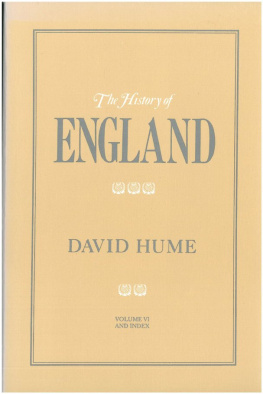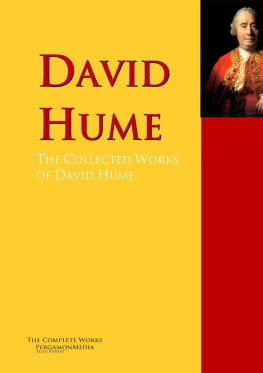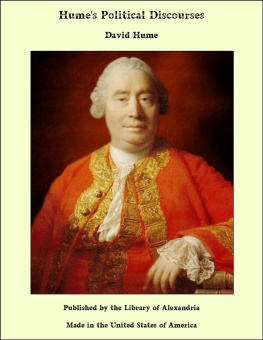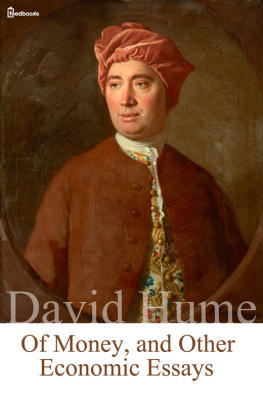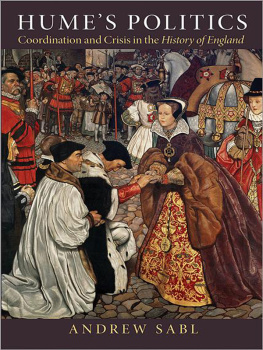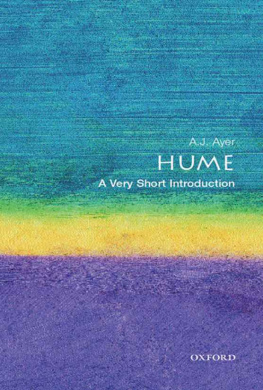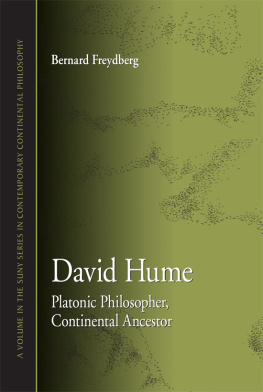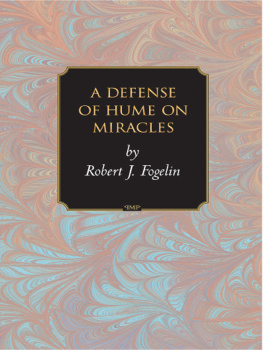THE LIFE OF DAVID HUME, ESQ.
WRITTEN BY HIMSELF.
MY OWN LIFE.
It is difficult for a man to speak long of himself without vanity; therefore I shall be short. It may be thought an instance of vanity that I pretend at all to write my life; but this narrative shall contain little more than the history of my writings; as, indeed, almost all my life has been spent in literary pursuits and occupations. The first success of most of my writings was not such as to be an object of vanity.
I was born the twenty-sixth of April, 1711, old style, at Edinburgh. I was of a good family, both by father and mother: my fathers family is a branch of the earl of Homes, or Humes; and my ancestors had been proprietors of the estate which my brother possesses, for several generations. My mother was daughter of Sir David Falconer, president of the college of justice; the title of Lord Halkerton came by succession to her brother.
My family, however, was not rich; and being myself a younger brother, my patrimony, according to the mode of my country, was of course very slender. My father, who passed for a man of parts, died when I was an infant, leaving me, with an elder brother and a sister, under the care of our mother, a woman of singular merit, who, though young and handsome, devoted herself entirely to the rearing and educating of her children. I passed through the ordinary course of education with success, and was seized very early with a passion for literature, which has been the ruling passion of my life, and the great source of my enjoyments. My studious disposition, my sobriety, and my industry, gave my family a notion that the law was a proper profession for me; but I found an insurmountable aversion to every thing but the pursuits of philosophy and general learning; and while they fancied I was poring upon Voet and Vinnius, Cicero and Virgil were the authors which I was secretly devouring.
My very slender fortune, however, being unsuitable to this plan of life, and my health being a little broken by my ardent application, I was tempted, or rather forced, to make a very feeble trial for entering into a more active scene of life. In 1734, I went to Bristol, with some recommendations to several eminent merchants; but in a few months found that scene totally unsuitable to me. I went over to France, with a view of prosecuting my studies in a country retreat; and I there laid that plan of life which I have steadily and successfully pursued. I resolved to make a very rigid frugality supply my deficiency of fortune, to maintain unimpaired my independency, and to regard every object as contemptible, except the improvement of my talents in literature.
During my retreat in France, first at Rheims, but chiefly at La Fleche, in Anjou, I composed my Treatise of Human Nature. After passing three years very agreeably in that country, I came over to London in 1737. In the end of 1738, I published my Treatise, and immediately went down to my mother and my brother, who lived at his country house, and was employing himself very judiciously and successfully in the improvement of his fortune.
Never literary attempt was more unfortunate than my Treatise of Human Nature. It fell dead-born from the press, without reaching such distinction as even to excite a murmur among the zealots. But being naturally of a cheerful and sanguine temper, I very soon recovered the blow, and prosecuted with great ardor my studies in the country. In 1742, I printed at Edinburgh the first part of my Essays. The work was favorably received, and soon made me entirely forget my former disappointment. I continued with my mother and brother in the country, and in that time recovered the knowledge of the Greek language, which I had too much neglected in my early youth.
In 1745, I received a letter from the marquis of Annandale, inviting me to come and live with him in England; I found also that the friends and family of that young nobleman were desirous of putting him under my care and direction, for the state of his mind and health required it. I lived with him a twelve-month. My appointments during that time made a considerable accession to my small fortune. I then received an invitation from General St. Clair to attend him as a secretary to his expedition, which was at first meant against Canada, but ended in an incursion on the coast of France. Next year, to wit, 1747, I received an invitation from the general to attend him in the same station in his military embassy to the courts of Vienna and Turin. I then wore the uniform of an officer, and was introduced at these courts as aid-de-camp to the general, along with Sir Harry Erskine and Captain Grant, now General Grant. These two years were almost the only interruptions which my studies have received during the course of my life: I passed them agreeably, and in good company; and my appointments, with my frugality, had made me reach a fortune which I called independent, though most of my friends were inclined to smile when I said so: in short, I was now master of near a thousand pounds.
I had always entertained a notion, that my want of success in publishing the Treatise of Human Nature had proceeded more from the manner than the matter, and that I had been guilty of a very usual indiscretion, in going to the press too early. I, therefore, cast the first part of that work anew in the Inquiry concerning Human Understanding, which was published while I was at Turin. But this piece was at first little more successful than the Treatise on Human Nature. On my return from Italy, I had the mortification to find all England in a ferment, on account of Dr. Middletons Free Inquiry, while my performance was entirely overlooked and neglected, A new edition, which had been published at London, of my Essays, moral and political, met not with a much better reception.
Such is the force of natural temper, that these disappointments made little or no impression on me. I went down, in 1749, and lived two years with my brother at his country house, for my mother was now dead. I there composed the second part of my Essay, which I called Political Discourses, and also my Inquiry concerning the Principles of Morals, which is another part of my Treatise that I cast anew. Meanwhile, my bookseller, A. Millar, informed me, that my former publications (all but the unfortunate Treatise) were beginning to be the subject of conversation; that the sale of them was gradually increasing, and that new editions were demanded. Answers by reverends and right reverends came out two or three in a year; and I found, by Dr. Warburtons railing, that the books were beginning to be esteemed in good company. However, I had fixed a resolution, which I inflexibly maintained, never to reply to any body; and not being very irascible in my temper, I have easily kept myself clear of all literary squabbles. These symptoms of a rising reputation gave me encouragement, as I was ever more disposed to see the favorable than unfavorable side of things; a turn of mind which it is more happy to possess, than to be born to an estate of ten thousand a year.




